#Psychotherapy And Existentialism
Photo
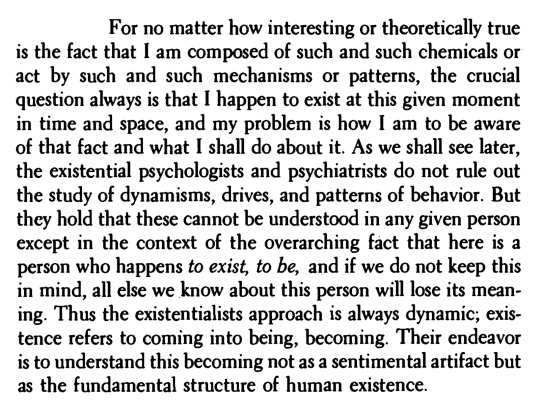
Rollo May, The Discovery of Being: Writings in Existential Psychology
186 notes
·
View notes
Text
“Forces beyond your control can take away everything you possess except one thing, your freedom to choose how you will respond to the situation.”
— Viktor Frankl, “Man's Search for Meaning”
#viktor frankl#philosophy quotes#philosophy#philosopher#philosophers#lit#literature#literature lover#literature quote#literature quotes#psychotherapist#psychotherapy#psychologist#psychology#psychiatry#logotherapy#existentialist#existentialism#quote#quotes#excerpts#excerpt
149 notes
·
View notes
Text
"The basic human group, the molecule of social life, was, as Freud thought, formed by the fear of death: the first people huddled together for fear of separation and for fear of what lurked in the darkness."
The studying weekend goes on and this gold shall be used :D
2 notes
·
View notes
Text
Growing up, choosing, separating oneself from others also mean facing loneliness and death.
- irvin yalom
2 notes
·
View notes
Text
Emotional Feeling and the Truth
I don't think people feel as strongly as they claim.
They only think they feel that strongly because they desire to feel that strength of emotion like they have heard others feel.
It's performative.
Some don't realize it and some actively know.
They try to cry harder.
Think more romantically.
I stopped trying to feel harder about romantic aspects and they haven't come strongly naturally.
I used to be so upset from social faux pas and I started to not try to feel or think strongly about it and it has not come naturally.
Is this self actualization, am I a sociopath who convinced herself she was normal, or is everyone like this?
Song that I'm listening to right now:
#psychoanalysis#psychothérapie#psychotherapy#sociopath#self actualization#note to self#journal#diaryposting#personal blog#journal entry#tw existential#existence#meaning#grunge#soft grunge#dark grunge#is putting grunge in tags cringe#it is#romantic#romanticisim#crying#emotions#emotion#mind#understanding#consiousness#philosophy#Spotify
4 notes
·
View notes
Text
#therapybites#couchcrumbs#psychotherapy#relationships#neuroscience#docheath#bitesizedtherapy#cognitive science#neuropsychology#forensic psychology#halloween#fear#fearful#manic panic#panicking#panic anxiety#anxiety counseling#existential anxiety#anxietysupport#anxietyrelief#anxietyawareness#jason voorhees#michael myers#freddie krueger#vampire#frankenstiensmonster
3 notes
·
View notes
Text

just had my first therapy session in years. it felt good because the person seemed to understand most of what i was saying. i know that's all it takes - understanding, or at least the feeling of being understood - but with over 8 billion people on the planet the only 2 people who seem to truly get me (for the most part) are my spouse and my therapist. i know that existential isolation is the experience of being fundamentally separate from other people, but i feel it so sharply that it makes me want to...but hopefully these appointments will mark the start of some healthy change for myself this year
0 notes
Text
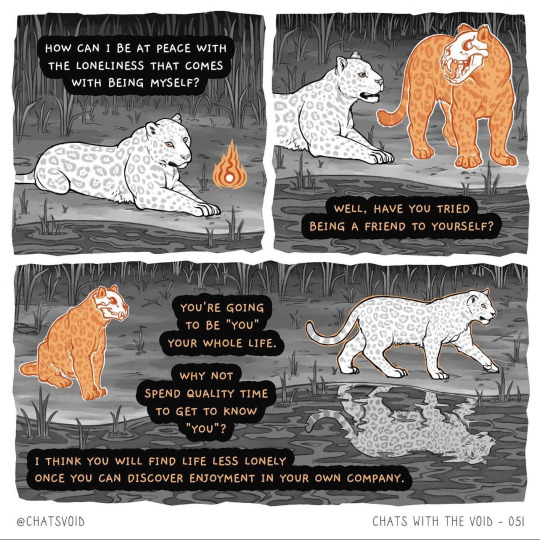
I’m very much aware that not much time has passed since I remember posting this particular Illustration.
I find myself revisiting more frequently the topic matter of solitude during my hours of self reflection as of late.
I have found that It is always important to pay close attention whenever involuntarily revisiting a familiar state of mind. It is only during these reoccurring visits, that you can judge your degree of progression or regression. The slightest change in the way your psyche has perceived the concept of time and consequently familiarity.
Because one would assume; of course not in a state of neurosis, that one would of been forced to have created the mental map and tools necessary to even have the privilege and capability of revisiting.

- Promethean.Dread
#morbid#emo#mental health#psychology#quotes#philosophy#mentally unstable#quoteoftheday#spokenword#self healing#existentialism#self improvement#psychotherapy#dark literature#literature#777
1 note
·
View note
Text
[“An unfortunate reality that still permeates many psychotherapy offices is the archaic belief that these trauma-bonded relationships can be remedied by teaching problem-solving strategies, communication skills, and conflict-management techniques. While these teachings are beneficial and certainly have their place when working within dysfunctional relationships, it is my personal and professional experience that these interventions do not access the core of what is disconnecting partners, nor do they get to the heart of the matter regarding the pathways that create meaningful change.
During my early years of counseling, helping couples and individuals on their relationship issues, I would also teach my clients how to apply these old techniques and strategies, but I felt a sense of insufficiency and guilt. I knew there was more underneath the surface of what they shared with me, which signaled the deeper issues that were so clear to me I could almost touch them. I knew that these painful tethers bonding my clients in fear and distress were the hidden patterns of unmet needs. I knew this. But how could I help my clients not just understand what was happening but deeply experience it and become conscious of it enough to reach out to their partner with vulnerability and clarity, to show up for their partner with openness and acceptance and make meaningful changes?
So I went on an exploration. I dove into clinical approaches like attachment theory and emotion-focused therapy. I studied somatic therapies and microexpressions and learned the language of the emotional body. I became a student of ancient philosophies, spirituality, and esoteric wisdom to acquaint myself with the meaning of life and become comfortable discussing existential truths that can sometimes paralyze us. I studied interpersonal neurobiology and various sciences to help me conceptualize the human brain and body in a state of connection or disconnection. I absorbed it all. One key takeaway I learned from my immersion into the human experience is this: Our relationships act as a mirror into the depths of our own selves. They show us what we accept, what we reject, and what we hide, sometimes even from ourselves. Our relationship dramas are the reenactments of unresolved traumas still locked within our mind and body, signaling our conscious mind where healing can take place. In this way, the journey to connection with another must be a simultaneous journey through reconnection with the self. This book is that journey.”]
laura copley, from loving you is hurting me: a new approach to healing trauma bonds and creating authentic connection, 2023
148 notes
·
View notes
Text
🎶"And we live in an actual niGHtMAAAAAAAAAAAAAARE-"🎶
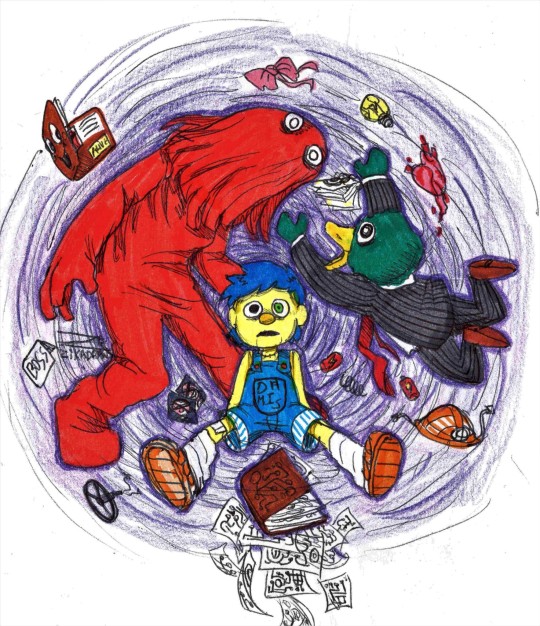
I don't watch this show other than the clips I see on Youtube and from here, but I do appreciate the chaos, muppet show parodying and downright existential horror ! Hopefully these guys will ever come anywhere close of unraveling the truth. Or at least learning their own names.
And by the way, I screwed around with the filters for this one, so as a bonus here's the OG scan and another pretty cool one with the most appropriate lighting focus.
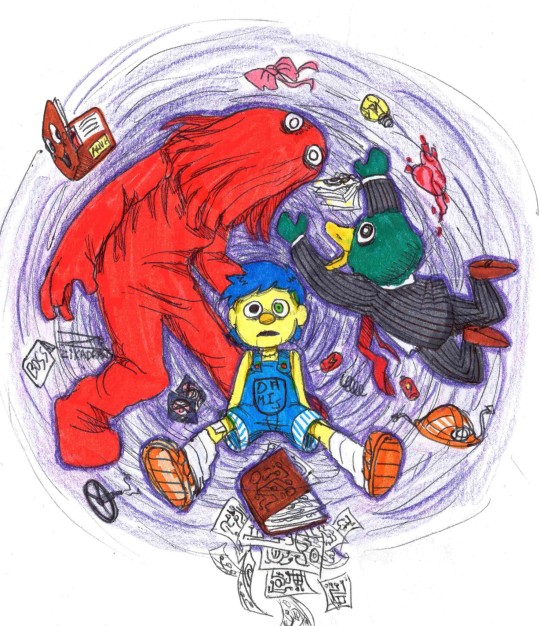
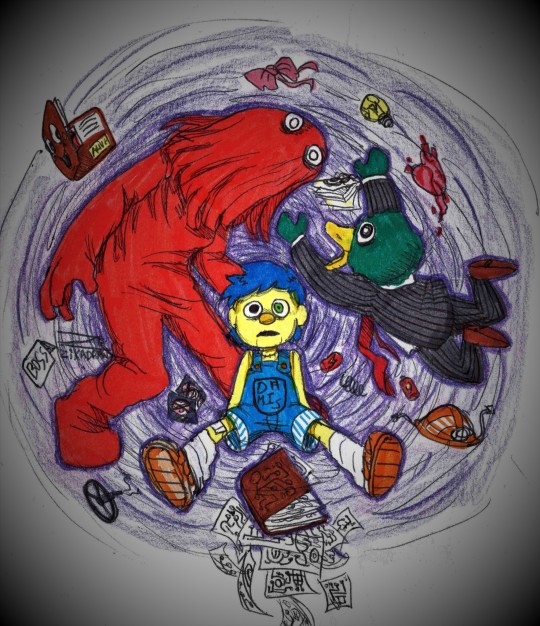
(Also I hope one day they'll get an episode themed around psychotherapy. Be it only for the literal mindf*ck. Do it cowards.)
Anyways
#randomness#dhmis#dhmis fanart#dhmis tv show#dhmis red guy#dhmis duck#dhmis yellow guy#don't hug me i'm scared#existential horror#scanner#fanart
193 notes
·
View notes
Text
Liminality (by any other name)
skill is the learned ability to act with determined results with good execution often within a given amount of time, energy, or both.
Life skills are abilities for adaptive and positive behavior that enable humans to deal effectively with the demands and challenges of life. The subject varies greatly depending on social norms and community expectations but skills that function for well-being and aid individuals to develop into active and productive members of their communities are considered as life skills.
..........
Liminal is an English adjective meaning "on the threshold", from Latin līmen, plural limina.
May refer to:
In anthropology, liminality is the quality of ambiguity or disorientation that occurs in the middle stage of a rite of passage, when participants no longer hold their pre-ritual status but have not yet begun the transition to the status they will hold when the rite is complete. During a rite's liminal stage, participants "stand at the threshold" between their previous way of structuring their identity, time, or community, and a new way (which completing the rite establishes). More recently, usage of the term has broadened to describe political and cultural change as well as rites. During liminal periods of all kinds, social hierarchies may be reversed or temporarily dissolved, continuity of tradition may become uncertain, and future outcomes once taken for granted may be thrown into doubt. The dissolution of order during liminality creates a fluid, malleable situation that enables new institutions and customs to become established. The term has also passed into popular usage and has been expanded to include liminoid experiences that are more relevant to post-industrial society.
Liminal beings are those that cannot easily be placed into a single category of existence.
liminal deity is a god or goddess in mythology who presides over thresholds, gates, or doorways; "a crosser of boundaries". These gods are believed to oversee a state of transition of some kind; such as, the old to the new, the unconscious to the conscious state, the familiar to the unknown.
Liminal spaces are the subject of an Internet aesthetic portraying empty or abandoned places that appear eerie, forlorn, and often surreal. Liminal spaces are commonly places of transition (pertaining to the concept of liminality) or of nostalgic appeal. Research from the Journal of Environmental Psychology has indicated that liminal spaces may appear eerie or strange because they fall into an uncanny valley of architecture and physical places.
Psychology:
Liminal experiences, feelings of abandonment (existentialism) associated with death, illness, disaster, etc. Existential thought bases itself fundamentally in the idea that one's identity is constituted neither by nature nor by culture, since to "exist" is precisely to constitute such an identity.
In Depth Psychology:
Jungians have often seen the individuation process of self-realization as taking place within a liminal space. "
Individuation can be seen as a "movement through liminal space and time, from disorientation to integration [...] What takes place in the dark phase of liminality is a process of breaking down [...] in the interest of 'making whole' one's meaning, purpose and sense of relatedness once more".
As an archetypal figure, "the trickster is a symbol of the liminal state itself, and of its permanent accessibility as a source of recreative power".
Jungian-based analytical psychology is also deeply rooted in the ideas of liminality. The idea of a 'container' or 'vessel' as a key player in the ritual process of psychotherapy has been noted by many and Carl Jung's objective was to provide a space he called "a temenos, a magic circle, a vessel, in which the transformation inherent in the patient's condition would be allowed to take place."
Jungians however have perhaps been most explicit about the "need to accord space, time and place for liminal feeling"—as well about the associated dangers, "two mistakes: we provide no ritual space at all in our lives [...] or we stay in it too long". Indeed, Jung's psychology has itself been described as "a form of 'permanent liminality' in which there is no need to return to social structure".
Please vote for a name! :)
#danny phantom#liminal#liminality#liminal spaces#liminal psychology#psychologeek#psychology#carl jung#life skills#skills#anthropology#liminal beings#liminal deity#infodump#interesting#core skills au
60 notes
·
View notes
Photo

Rollo May, The Discovery of Being: Writings in Existential Psychology
161 notes
·
View notes
Text
“Some day soon, perhaps in forty years, there will be no one alive who has ever known me. That's when I will be truly dead - when I exist in no one's memory. I thought a lot about how someone very old is the last living individual to have known some person or cluster of people. When that person dies, the whole cluster dies, too, vanishes from the living memory. I wonder who that person will be for me. Whose death will make me truly dead?”
— Irvin D. Yalom, “Love's Executioner and Other Tales of Psychotherapy”
#irvin d. yalom#irvin yalom#literature lover#literature quotes#english literature#lit#literature#philosophy quotes#philosophers#philosopher#philosophy#existentialist#existentialism#psychotherapist#psychotherapy#psychiatry#psychologist#psychology#literature quote#quote#excerpts#quotes#excerpt#books#bookworm#booklover#book#death#memory
26 notes
·
View notes
Text
Postpartum Depression Symptoms
Postpartum Depression is the onset of a depressed mood and its associated symptoms within the first year of childbirth, lasting more than two weeks with or without treatment.
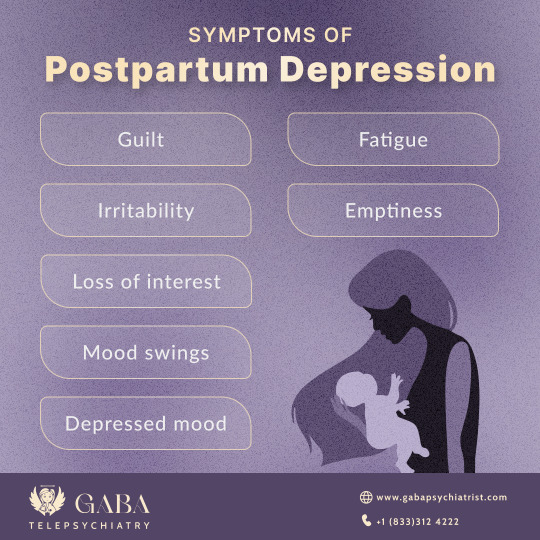
It is vital to seek help and treatment for postpartum depression. Failure to do so may result in long-term negative consequences for both the mother and the baby.
What are the Symptoms of Postpartum Depression?
Since postpartum depression arises during a time in a mother's life when society expects her to be happy about the arrival of her new baby, it can be very isolating for mothers.
Postpartum depression symptoms can manifest in a variety of ways. It may affect one's emotions, perception, ideas, and bodily experiences. Postpartum depression can cause hallucinations, delusions, and paranoia in severe cases.
Symptoms of postpartum depression are usually classified as follows:
Physical Symptoms of Postpartum Depression
Fatigue
Headache
Back pain
Muscle ache
Joint pain
GI upset
Abdominal pain
Low sex drive
Cognitive Symptoms of Postpartum Depression
Inattention
Impaired executive functioning
Impaired problem solving
Impaired neuroplasticity
Memory loss
Slow reaction time
Mood Symptoms of Postpartum Depression
Bad mood
Low motivation
Loss of ambition
Loss of enjoyment in activities
Loss of will to live
Sleep disturbance
Loss of appetite
Psychotic Symptoms of Postpartum Depression
Hallucinations
Delusions
Loss of touch with reality
Paranoia
When psychotic symptoms occur together with postpartum depression, this is known as 'Postpartum Psychosis'. It is critical to seek immediate support if such a situation arises.
Thought Distortions with Depression
Negative thoughts about oneself
Negative thoughts about others
Pessimistic thoughts about the future
Excessive guilt about the past
Low confidence in abilities
Low self-worth
Angry thoughts
Nihilistic thoughts
Suicidal thoughts
Existential angst
How can untreated Postpartum Depression Symptoms impact your Career?
Mothers experiencing postpartum depression may experience problems with:
Energy levels
Motivation levels
Attention
Concentration
Irritability
Engagement with colleagues
Reasoning and problem-solving abilities
Frustration tolerance
Productivity
They may require help to complete tasks, meet deadlines, or take excessive time off work. They may find themselves in conflict with colleagues and supervisors with whom they previously worked well.
Similarly, colleagues and supervisors may be perplexed, frustrated, and unsure of how to address the issue of change in a beloved colleague and friend. After all, nobody wants to be a "workplace bully" or impolite to a new mother.
Working mothers who suffer from PPD are also more likely to be passed over for promotion or even fired from their current jobs.
What is the Treatment for Postpartum Depression?
Finally, treatment for postpartum depression must address the underlying cause.
Check for medical causes of postpartum depression, including anemia, thyroid disease, Sheehan's syndrome, nutritional deficiencies, and polycystic ovarian syndrome
Establish sleep hygiene and work with a partner to schedule catch-up sleep times
Educate both the mother and the partner
Document workplace accommodations
Consider what assistance is required so the mother can continue working if desired or needs to take time off
Use available resources, such as childcare, and, if possible, contact family members, including grandparents
Nutritional supplementation, if necessary
Counseling on breastfeeding and other issues
Psychotherapy
Individual Psychotherapy
Medications if symptoms persist and interfere with social and occupational functioning
Alternative treatments include meditation, yoga, acupuncture, and exercise
Why is it important to get Treatment for Postpartum Depression?
Untreated postpartum depression symptoms can disrupt both your personal and professional lives. Consequences for babies include disruption of attachment and bonding, anxiety, failure to thrive, feeding difficulties, developmental delay, long-term relationship difficulties, cognitive impairment, failure to meet milestones, and difficulty with social or occupational functioning.
Effects of Postpartum Depression on Health
Significant drop in energy and motivation levels
Feelings of restlessness
Disrupted sleep cycles
Insufficient or excessive sleep
Chronic stomach issues, headaches, or body pain
Poor self-care
Help for Postpartum Depression
It is critical to seek treatment for postpartum depression. Untreated depression can have long-term consequences for academic performance, careers, relationships, and physical health.
Call +1(833)312-4222 for Postpartum Depression help. For more information, visit https://gabapsychiatrist.com/postpartum-depression-treatment/
Seek effective and barrier-free treatment from a board-certified and licensed Online Psychiatrist at Gaba Telepsychiatry.
#health & fitness#mental health#postpartum#healthcare#motherslove#motherhood#parenting#momlife#post partum
5 notes
·
View notes
Note
What a wonderful milestone for you today. Thinking about you comment about inner work and experiencing time…with Covid, some relational psychotherapy, and some psychedelic medicine work I am having a strong sense that time is non-linear. We try our best to convince ourselves that it is by referencing the mechanism of a clock but our bodies don’t really tell time, at least not in that way. Wondering if you feel that as well or have a different feelings about how time is passing for you on your current journey.
Thank you for such a thought-provoking question, Steve. I haven't put the idea of feeling time in my body into words, but the way you phrased that has had me thinking for days. I do notice a deeper awareness of how I feel inside my body when I think about time passing so bloody fast these days. I get a panicked tummy drop and sometimes my heart skips a beat.
And then I think about how moments from the past feel like they are right here right now and how I still feel like the person who experienced those things - the 22-year-old who decided to drop out of school and move to NYC has been front and center recently and I can recall smells and tastes and textures from those early years as if they are happening in this moment. Like time is a lake we swim in and it's all around us.
It's difficult not to worry about how many years I might have left and how many years parts of me feel like I have wasted and the impact of the existential inertia that seems to be the product of that same worry. How very meta. I suppose this is why I am in therapy again. Time's a-tickin'. Or is it?
I don't know if I'm making any sense here, but I appreciate the question and the invitation to think about it more deeply.
27 notes
·
View notes
Photo

A little history of the Fierce Goddess - Engelsberg Ideas
Perhaps what Ramprasad Sen, John Woodroffe, and others saw in Kali was the promise of a rare ability: the power to see clearly the darkness of life and transmute it into something psychologically bright, and existentially worthwhile. In a sense, the Kali-devotee is an existential alchemist. Today the best terms for explaining the fierce goddesses may come from Woodroffe’s contemporary, Sigmund Freud. In 1915 Freud was just beginning to deploy the language of ‘repression,’ urging his readers not to hide from pain, but to welcome catharsis and reconcile ourselves to the experiences that have made us who we are. Fierce goddesses function as a kind of psychotherapy that helps us to acknowledge the mingled sadness and splendour of life. In Woodroffe’s words, we are ‘now illuminated by Her light, now wrapped in her terrible darkness.’ The dark beauty of Kali, creatrix of worlds, transcends us all.
56 notes
·
View notes